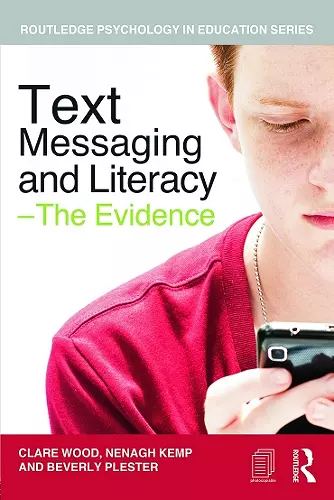Text Messaging and Literacy - The Evidence
Clare Wood author Nenagh Kemp author Beverly Plester author
Format:Paperback
Publisher:Taylor & Francis Ltd
Published:16th Aug '13
Currently unavailable, and unfortunately no date known when it will be back
This paperback is available in another edition too:
- Hardback£145.00(9780415687157)

"Well thought out and timely. This is the leading group in the world working on texting and literacy, and they have a strong track record of publications. It would also be the first book, as they say, to deal with the subject at an academic level. The focus on education is important, as this is where most of the anxieties lie. It will be a major step forward in creating a new climate."
Professor David Crystal, author of The Cambridge Encyclopaedia of Language and The Cambridge Encyclopaedia of the English Language, Television consultant and presenter
As children are given mobile phones at increasingly younger ages, there is considerable media coverage of claims that mobile phones, and text messaging in particular, are responsible for declining levels of literacy in children and young people. Such claims are often adopted wholesale by teachers and parents, despite the fact that there is an empirical literature which has failed to find a basis to these claims, and to the contrary has found that text messaging is supporting children’s literacy skills.
Written by leading international researchers Text Messaging and Literacy presents an overview and discussion of the academic evidence for and against use of text messaging and mobile phones in supporting literate activity and discusses what conclusions we can and should draw about the impact of mobile phones, and their potential role in education.
Areas covered include:
- the rise of texting and media reactions;
- children’s reading, spelling and texting;
- text messaging of children with language difficulties;
- using mobile phones for literacy development;
- texting and literacy skills in adolescents and adults;
- spelling and grammar in texting and beyond;
- the future of texting.
In challenging existing assumptions the authors present the cutting edge of international research, highlighting their own studies involving children of all ages, adolescents and adults. This ground breaking book is essential reading for both researchers and students in education, educational psychology, literacy and new media and it’s impact on learning.
"I was impressed by the way the authors evaluated and discussed research methods throughout, but in particular they devote a chapter to methodological issues. This chapter reviews the strengths and weaknesses of the different techniques used to elicit, collect and interpret textisms. The authors cover self-report, observational and experimental methods and ways to analyse include counting, categorising and thematic analysis. The chapter will be of great use to researchers wanting to interpret work already conducted and to help them plan future studies in a way that allows them to draw the most meaningful interpretations from their data."- Jacqui Taylor, Bournemouth University, UK
ISBN: 9780415687164
Dimensions: unknown
Weight: 234g
128 pages